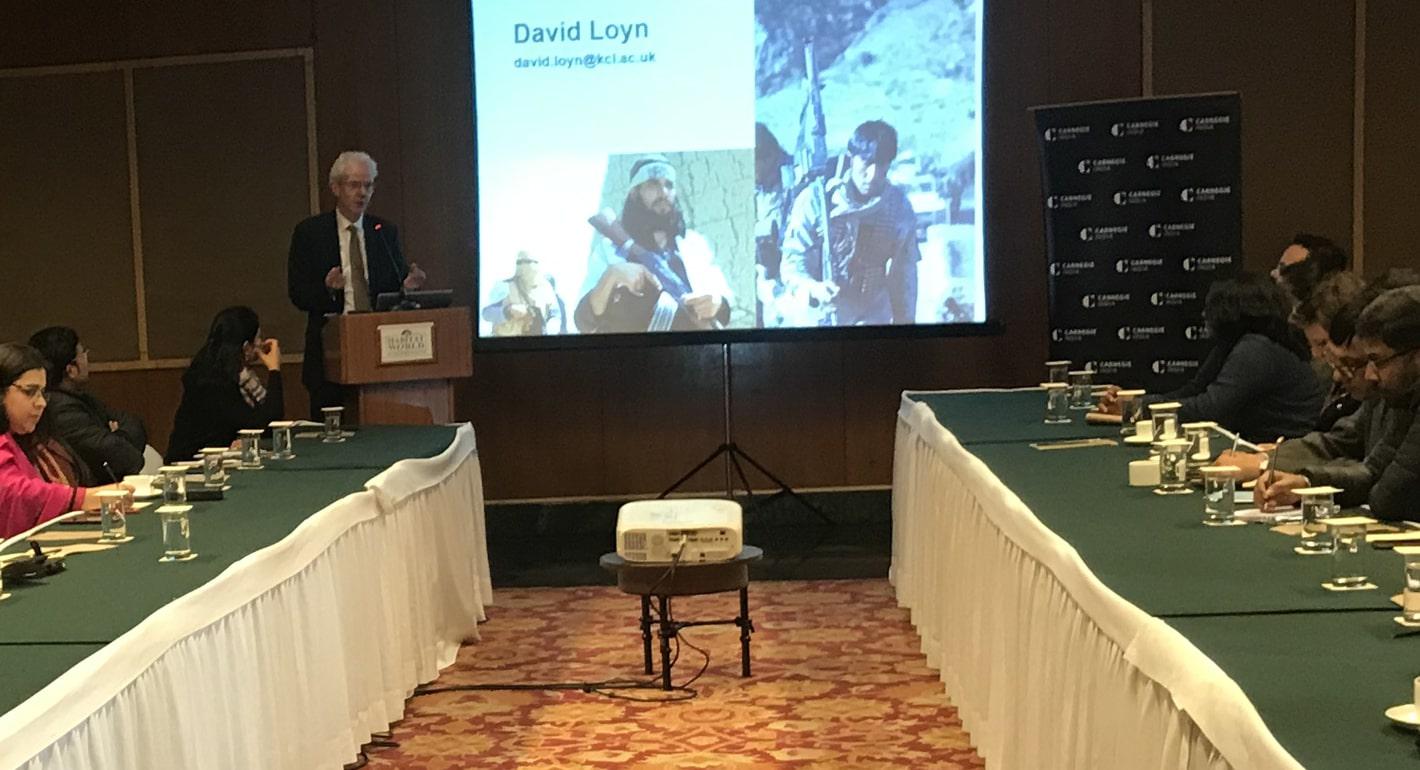In the last week of 2019, rumors emerged about the Taliban agreeing to a temporary ceasefire in Afghanistan, despite the insurgent group’s official spokesperson denying any ceasefire agreement. Both American and Afghan officials have called for a commitment from the Taliban to reduce violence before formal talks resume since an attack by the Taliban on a U.S. airfield last month stalled the negotiations. However, recent reports suggest that U.S.-Taliban talks, to end the war and pave the way for intra-Afghan reconciliation, are expected to resume shortly.
Carnegie India hosted David Loyn, a senior visiting research fellow in the War Studies Department at King’s College London, who examined the prospects for reconciliation in Afghanistan. This discussion was moderated by Rudra Chaudhuri, director of Carnegie India.
DISCUSSION HIGHLIGHTS
- Negotiations: Participants noted that the United States, the Afghan government, and the Taliban have increasingly focused on negotiations because they are faced with a mutually hurting stalemate. The conflict has entered a deadlock in which both sides, the Taliban and the coalition forces, are suffering losses but neither can secure a military victory, participants explained. Participants highlighted that Afghan President Ashraf Ghani has been particularly pro-active in this process, from simplifying the ceasefire architecture and launching the Kabul Peace Process in 2017 to facilitating the 2018 Eid ceasefire. However, his government lacks the momentum to build on this to conduct intra-Afghan dialogue to achieve peace. On the U.S. role, participants stated that while President Trump initially emphasized the possibility of winning the war, he later decided to negotiate directly with the Taliban, for which he appointed Ambassador Zalmay Khalilzad to lead the process. Participants highlighted that Khalilzad initially succeeded in negotiating a deal, which promised withdrawal of U.S. troops, Taliban severing links with international terrorist groups, preparation for a ceasefire, and intra-Afghan talks. Noting that this deal collapsed, participants cautioned that if a new deal only succeeds in securing the withdrawal of U.S. troops, it will benefit the Taliban.
- Prospects for A Peace Deal: Participants argued that a peace deal negotiated between the United States and the Taliban may not be sustainable because the interests of the Afghan government and the Taliban are incongruous. Participants stated that unlike the former, the latter wants to transform Afghanistan from an Islamic Republic to an Islamic Emirate that is governed by a council of mullahs. They added that achieving peace in Afghanistan is further complicated by both the Afghan government and the Taliban lacking a unified approach. Participants drew attention to the low morale within the insurgent group but cautioned that several young commanders want to continue fighting.
- External Actors: Participants discussed the role of foreign stakeholders in the Afghan peace process, particularly Iran, Russia, Pakistan, China, and India. Participants emphasized Iran’s interests in the peace process given its shared border with Afghanistan and the presence of a Shia-minority population in the latter. However, they cautioned that the adversarial relationship between the Unites States and Iran may complicate the resolution of the conflict in Afghanistan. Further, they highlighted that as the United States plans to withdraw from Afghanistan, Russia has stepped up its involvement. Participants also noted Pakistan’s influence over the Taliban, emphasizing its potential role in achieving or hampering reconciliation in Afghanistan. China, participants stated, has economic interests in Afghanistan. The restoration of peace and order in Afghanistan will provide China with the opportunity to tap into the former’s mineral resources, participants added. They also drew attention to China’s role in achieving reconciliation and peace, given its influence over Pakistan. Participants emphasized India’s development assistance to Afghanistan and noted its interest in Afghan-led peace talks. However, they also highlighted that India-Pakistan tensions may spillover into the Afghan theatre.
- India’s Role: Participants emphasized India’s close engagement with Afghanistan, particularly their shared historical and cultures ties. They stated that, following the overthrow of the Taliban, New Delhi has focused on providing developmental assistance to Kabul in an attempt to build a relationship based on trust. Participants suggested that India should build on this to contribute to the peace process by engaging all sides, including the Taliban. To achieve this, they clarified that India should work with other neutral states, such as Germany, while mediating.
This event summary was prepared by Rahul Bhatia, a research intern at Carnegie India.
Speaker
David Loyn
David Loyn is a senior visiting research fellow in the War Studies Department at King’s College London. He is also a lecturer for the Foreign and Commonwealth Office’s Diplomatic Academy course at King’s and a member of the advisory panel to the Foreign Office on South Asia policy. From 2017-18, Loyn worked as the strategic communications adviser in the office of the Afghan President. Prior to this, he worked for the BBC from 1987 to 2015, where his last post was as a correspondent in Afghanistan.
Moderator
Rudra Chaudhuri
Rudra Chaudhuri is the director of Carnegie India. His primary research interests include the diplomatic history of South Asia and contemporary security issues.
